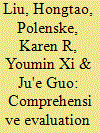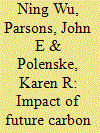| Srl | Item |
| 1 |
ID:
110370


|
|
|
|
|
| Publication |
2011.
|
| Summary/Abstract |
We present evidence for the coexistence of two antagonistic sugarcane ethanol production technologies in Brazil, with the Southeast region of the country having relatively mechanized production processes, and the Northeast area using labor-intensive ones. We highlight the main differences between the hand-production and fully automated mechanical manufacturing in the Brazilian ethanol industry and examine the historical, political, and economic factors that induced this regional technology gap that is currently observed. We then construct an environmental model based on a 375-industry interregional input-output system for the Brazilian regions, in order to determine the extent to which the primitive ethanol production of Northern Brazil differs from the automated manufacture technologies of the South in terms of greenhouse gas emissions. We show that ethanol produced with modern technologies generates lower carbon dioxide (CO2) emissions than ethanol produced with traditional production processes. We also demonstrate that ethanol, regardless of the technology with which it was produced, is more carbon-efficient than petrochemical products.
|
|
|
|
|
|
|
|
|
|
|
|
|
|
|
|
| 2 |
ID:
098689


|
|
|
|
|
| Publication |
2010.
|
| Summary/Abstract |
Greater use of renewable energy is being aggressively promoted to combat climate change by the Chinese government and by other governments. Agricultural straw is the kind of renewable energy source that would become a pollution source if it is not well utilized. We select the Shiliquan straw-based electricity generation project in Shandong Province, China as a case and assess environmental externalities of straw utilization in power plants by using life-cycle analysis. Results show that straw-based electricity generation has far fewer greenhouse gas (GHG) emissions than that of coal-based electricity generation. Improvement in the energy efficiency of equipment used for straw's pretreatment would lead to a decrease of GHG emissions and energy consumption in the life-cycle of straw-based electricity generation. In case 400 million tonnes of wasted straw in China could be used as a substitute for 200 million tonnes of coal, annually the straw 291 Terrawatt hours (TWh) of electricity could be generated, resulting in an annual total CO2 emissions savings of 193 million tonnes. Straw-based electricity generation could be a high-potential alternative for electricity generation as well as an incentive for utilizing wheat straw instead of burning it in the field.
|
|
|
|
|
|
|
|
|
|
|
|
|
|
|
|
| 3 |
ID:
118832


|
|
|
|
|
| Publication |
2013.
|
| Summary/Abstract |
Carbon capture and storage (CCS) in China is currently discussed extensively but few in-depth analyses focusing on economics are observed. In this study, we answer two related questions about the development of CCS and power generation technologies in China: (1) what is the breakeven carbon-dioxide price to justify CCS installation investment for Integrated Gasification Combined Cycle (IGCC) and pulverized coal (PC) power plants, and, (2) what are the risks associated with investment for CCS. To answer these questions, we build a net present value model for IGCC and PC plants with capacity of 600 MW, with assumptions best representing the current technologies in China. Then, we run a sensitivity analysis of capital costs and fuel costs to reveal their impact on the carbon price, and analyze the risk on investment return caused by the carbon price volatility. Our study shows that in China, a breakeven carbon price of $61/tonne is required to justify investment on CCS for PC plants, and $72/tonne for IGCC plants. In this analysis, we also advise investors on the impact of capital and fuel costs on the carbon price and suggest optimal timing for CCS investment.
|
|
|
|
|
|
|
|
|
|
|
|
|
|
|
|